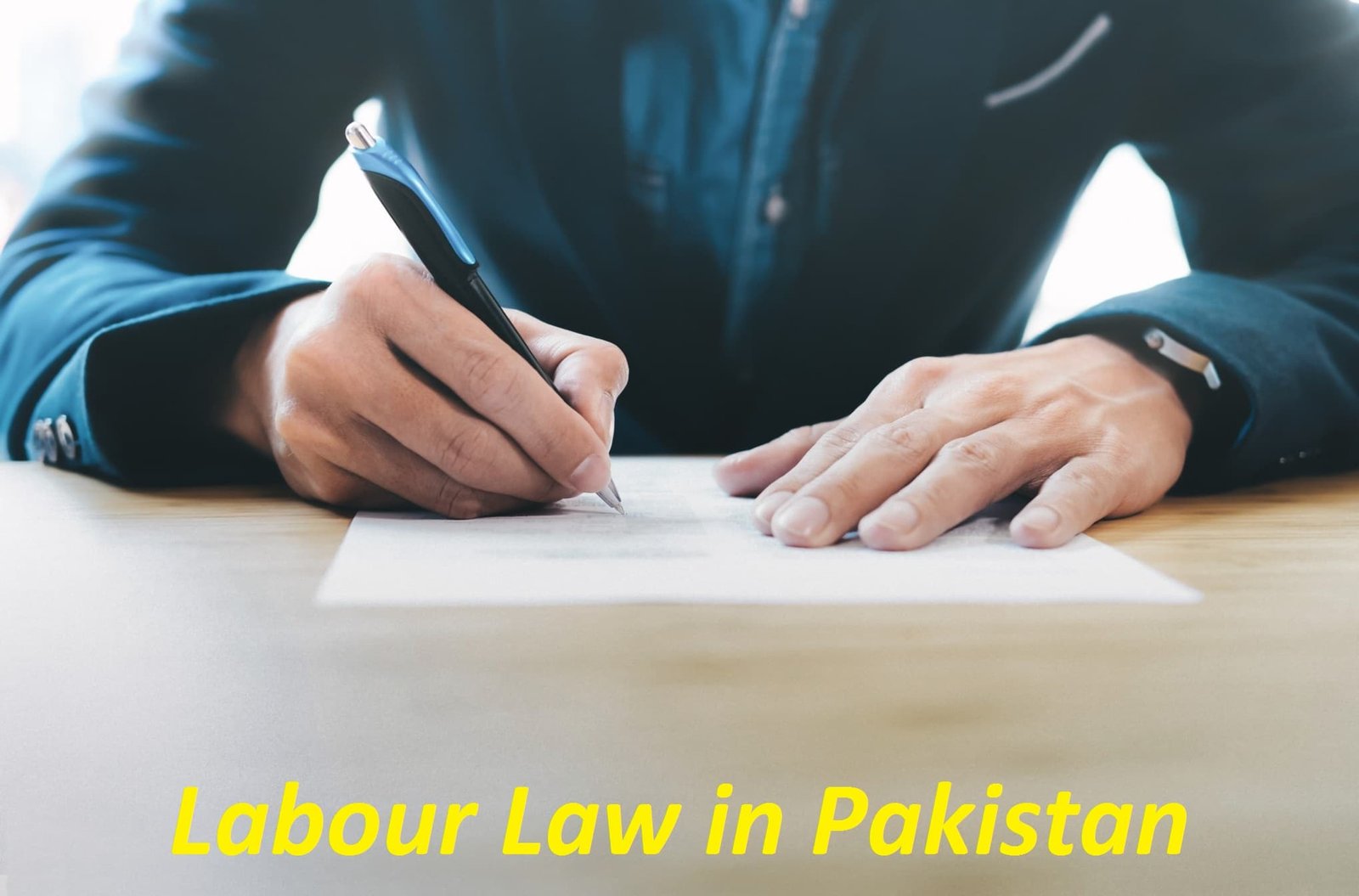Labour Laws in Pakistan is very detailed and also includes numerous Ordinances, Acts, Rules & Regulations and all various other laws relating to Industrial, Commercial and Labour Establishments which are widely spread and hard to reach statutes. These various regulations give authentic guide to the Companies, the Workers, the Trade Unions and the concerned Agencies to recognize their respective duties and to become aware of their prescribed labour lawful rights to be asserted. Our Law Firm has the major challenge give the legal services concerning these Labour Legislations to the Companies and the Staff members for the smooth operating of business in order to achieve the target of greater successfully, reasonable profits and also better wages. You can also read Divorce law in Pakistan
Labour legislation arbitrates the connection between workers, utilizing entities, trade unions and also the government whereas employment law is the collection of laws and policies that regulate connections in between companies and employees. Joint labour legislation relates to the three-way partnership in between worker, company and the union as well as private labour regulation matches staff members’ legal rights at the office via contract. When an employer works with worker, the legislations cover what an employer has to pay the employee for their duties, with minimal degree of requirements within the workplace.
We deal in the matters of consultation of an employees or companies, cases of Civil Servants, relating to workers or workers, appointment and also discontinuation matters, cases about recruitment consultation, promotion and also reversion to a reduced quality or solution, removal type solution, issues of pension, gratuity and provident fund, all type of instances regarding service and employment.
What are Work Rule for Labours?

Work laws (additionally known as labor regulations or employment laws) are those that mediate the relationship between workers, utilizing entities, trade unions and the federal government. Collective work law associates with the tripartite connection between employee, employer and union. Individual work regulation concerns employees’ rights at the workplace also with the contract for job. Employment criteria are social standards (in some cases also technical criteria) for the minimum socially acceptable problems under which employees or professionals are permitted to work. Federal government companies (such as the former US Work Standards Management) enforce labour law in pakistan(legislature, regulative, or judicial).
Employment
Work Employment considered as a basic idea and classification of labour laws in pakistan is a fairly recent growth. Before the Great Clinical Depression and World War II the emphasis was upon the prevention or decrease of excessive unemployment rather than upon long-term work plan as part of an extensive scheme to promote financial security and growth. The brand-new strategy, arising from changes in political overview and also modern financial idea, has progressively located expression in lawful arrangements that establish the development of employment possibility as a general purpose of policy. To this end, regulations has developed the necessary legal structure for the projecting of labour requirements and accessibility and the provision of employment services consisting of positioning, employment, employment training, and also apprenticeship. Freedom from compelled labour, equality of treatment in employment and profession, and welfare might, in a broad sense, be regarded as part of the same general subject.
Historic Background the United Kingdom developed its existence in South Asia in the very early part of the 17th century. By the 1850’s, the British had actually increased their impact and managed the majority of the Indian sub-continent, that included contemporary Pakistan and Bangladesh. In 1857, the administration of the country was handed over to the British government.
Opposition to British rule started at the turn of the 20th century. Although energetic initiatives were made to include Muslims in the Indian nationalist movement, concern for Muslim political legal rights led to the development of the Muslim League in 1906.
The concept of Pakistan, a Muslim nation distinct from Hindu India, was introduced in the 1930s, as anxiety grew amongst Indian Muslims of coming to be a minority in Hindu India. In 1940, the Muslim League, led by Muhammad Ali Jinnah, called for the development of a separate Muslim state, in the areas that housed a majority of Muslims.
The Indian Independence Act, which entered into effect on 15 August 1947, provided for the dividing of British India, and the establishment of a separate independent dominion within the Commonwealth, Pakistan. Under this plan, the numerous handsome states could freely join either India or Pakistan. This caused a bisected Muslim nation divided by Indian region, made up of an East Pakistan (present-day Bangladesh) and West Pakistan.
Troubles increased in Kashmir, where a Hindu Maharaja ruled over a Muslim bulk. He transferred Kashmir to India, however Pakistan refused to understand the accession. The status of Kashmir has actually continued to be in dispute.
Muhammad Ali Jinnah came to be the very first governor-general of Pakistan, as well as Liaquat Ali Khan its first Prime Minister. In March 1956, Pakistan ultimately produced a constitution and also officially ended up being an Islamic republic within the Commonwealth. General Iskander Mirza became its first president. In October 1958, President Mirza abrogated the Constitution, prohibited political parties, stated martial law and granted power to General Muhammad Ayub Khan. In 1960 he was chosen to the presidency and eliminated the office of head of state.
East Pakistan stated its independence as Bangladesh on 26 March 1971, which was identified by Pakistan’s President, Zulfikar Ali Bhutto, in February 1974.
A new Constitution was promulgated in 1973 already President Bhutto. In 1988, Head of state Zia proclaimed the supremacy of Shari’a, whereby all civil law had to conform to Islamic Legislation. In November of the very same year, elections brought the very first elected female in a Muslim nation, Benazir Bhutto, little girl of Zulfikar Ali Bhutto, to the head of the state. She governed until 1996. In October 1999, General Pervez Musharraf, in an armed forces coup, deposed Prime Minister Nawaz Sharif, issued a Provisional Constitutional Order, suspended the Constitution and the federal as well as provincial parliaments, and designated himself as Chief Executive. In August 2002, President Musharraf promulgated 29 constitutional modifications (the Judicial Framework Order) with the effect of making Presidential power resistant to any political opposition in the parliament. In October 2002, Legislative elections were held and Pakistan Muslim League-Quaid (PMLQ) leader Zafarullah Khan Jamali was elected Prime Minister. Elections to the Pak Senate were held in February 2003. By March of the exact same year, the Constitution was fully recovered. In December 2003 a number of new amendments were presented to the Establishment, which rather limited the Governmental powers.
Labor Civil Liberties in the Constitution of Pakistan

The constitution of Pakistan highlights the need for labour laws in Pakistan. Complying with are the short articles that discuss the significance of labour laws in culture.
- Article 11 of the Constitution forbids all kinds of enslavement, required work, and kid labour.
- Article 18 discuss the right of its residents to enter upon any type of lawful profession or profession and also to perform any legal trade or company.
- Article 17 highlights the right to exercise the flexibility of organization and also the right to form unions.
- Article 25 is about equal rights prior to the regulation and also the restriction of discrimination on the grounds of sex alone.
- Article 37( e) makes provision for protecting simply as well as humane conditions of work, ensuring that children and ladies are not utilized in vocations unsuited to their age or sex, and also for maternal advantages for women in employment.
Labour laws in Pakistan
Pakistan’s work regulations date back to the Indo-Pakistan partition times. Since then, the legislations have been continuously progressed and boosted. With test & mistake and also years of experience, the laws have been improved a whole lot. Today, the work law of Pakistan thinks about socio-economic conditions, commercial advancement, population, work force explosion, development of trade unions, degree of proficiency, and also social welfare. Under the constitution, labour legislations belong and also duty of both the Federal and Provincial Federal Governments.
Agreement of Employment
The Industrial and Commercial Work Regulation was made in 1968 to deal with the shared connection in between staff member and also the company as well as the nature of the contract in between them.
The Statute puts on all commercial as well as industrial businesses in Pakistan that have 20+ employees.
Besides these establishments, the non-formal workers including domestic servants, farmworkers, or casual labour engaged by specialists have rather more comprehensive legislations because their labour agreements are generally word-of-mouth as well as can be applied via the courts based on dental proof or past technique.
Every employer is qualified to offer an official consultation letter at the time of employment of each worker. The contract ought to consist of significant conditions of work, nature, as well as period of consultation, pay allocations, and various other advantages, terms, and conditions of visit.
Discontinuation of Employment
According to the labour laws in Pakistan, the company cannot terminate any kind of staff member for any factor besides misbehavior. After serving the staff member with a termination notice, the employer needs to provide one month’s notice to the long-term worker.
If the worker wishes to leave prior to the notification period, she or he has to give one month’s wage as a fine. One month’s salaries are calculated based on the ordinary wage gained during the last three months of service. Various other classifications of employees are not qualified to see or pay instead of notice.
To maintain oneself safe from the exercise of power, victimization, or unjust labour methods, the Labour Courts have been enabled to examine as well as interfere to learn whether there has been an infraction of the concepts of natural justice and whether any action by the employer was Bonafede or unjust.
Working Time as well as Rest Time

Maternity Leave as well as Maternal Protection
While post 37 of the Constitution refers to pregnancy benefits for women in work, there are two main enactments, one government and also the other provincial providing pregnancy benefits to women used in specific line of work. The Pregnancy Advantage Statute, 1958 stipulates that upon the conclusion of four months employment or qualifying period, an employee may have up to 6 weeks prenatal and postnatal leave during which she is paid an income drawn on the basis of her last pay. The Ordinance applies to all commercial and business establishments utilizing females leaving out the tribal locations. It likewise places constraints on the termination of the lady during her maternity leave. In a similar way, the Mines Maternity Advantage Act, 1941 is applicable to ladies employed in the mines in Pakistan.
Legal power
The Majlis-e-Shoora (Parliament) of Pakistan consists of two Residences i.e., the Senate (Upper House) and the National Assembly (Lower Residence). The Senate is a permanent legislative body and is consisted of 100 members, of which participants of the four Provincial Assemblies, Government Provided Tribal Areas as well as Federal Resources develop its selecting university. The regard to the Senators is 6 years. The Constitution provides for the number of women to be chosen in the different bodies. The Senate might not be liquified. The National Assembly has a complete membership of 342 elected with adult suffrage, of which 60 seats are booked for ladies, and 10 seats are booked for non-Muslims. The seats of the National Assembly are designated to every District, the Federally Carried Out Tribal Locations and also the Federal Resources on the basis of their population based on the last formally released demographics.
The Federal Legal List, which identifies the subjects within the single legislative purview of Parliament, is separated right into two parts. Regulations on items in the initial component, that includes nationwide defense, nationality and citizenship, foreign events, public service and a wide variety of other products, should be introduced in the National Assembly. If passed by the National Assembly, the bill is then sent to the Us senate for consideration. Within a duration of ninety days, the Senate may either pass the bill with or without amendment, or deny it entirely. If the Us senate must stop working to take any type of activity on the costs within the proposed amount of time, the expense is deemed to have actually been passed without change. It after that moves on to the President for acceptance as well as for magazine as an act of Parliament. An amended or declined bill should be reconsidered by the National Assembly as well as, if it is once more gone by that body, with or without change, the expense is forwarded to the Head of state for his/her assent.
All other proposed regulations, bills associating with products in the 2nd part of the Federal Legislative List or in the Simultaneous Legislative List might be presented in either house. The Concurrent Legal List located in Short article 70( 4) of the Constitution, includes provisions for the welfare of labor: problems of labor, company’s liability, employees’ payment and also health insurance; trade unions, industrial and labor conflicts; facility of as well as continuing of labor exchanges, work information bureaus and training establishments; guideline of labor and security in mines, manufacturing facilities and oil- areas; and also unemployment insurance. Costs stemming from the 2nd part of the Federal Legislative Checklist or the Concurrent List are sent to the Head of state for his/her trademark. If within 7 days, he or she stops working to do so, the expense instantly comes to be an act of Parliament.
The Islamic Republic with its government funding at Islamabad is comprised of 4 districts: Punjab, Sindh, North West Frontier and Baluchistan, along with the Government Administered Tribal Locations. All residual powers fall to the Provincial Governments, although the Majlis-e-Shoora keeps exclusive power to enact laws for those locations in the Islamic Republic of Pakistan, which are not passed on to any type of District. In particular, responsibility for education and learning, labour, health and wellness, industry, social welfare, farming, as well as roads is mainly turned over to the Provinces, even though the solution of basic concepts in some of these issues is shared in the Simultaneous Legislative List.
Other Leave Privileges
In addition to the 14 days of annual leave with pay, the Factories Act, 1934 offers that every employee is entitled to 10 days laid-back leave with full pay and also better 16 days ill or medical leave on fifty percent pay. Informal leave is provided upon contingent situations such as sudden illness or any other urgent function. It needs to be obtained on prior application unless the seriousness protects against the production of such application. As a customary practice, causal leave is authorized in many cases. Authorized leave, on the other hand, may be availed of on support of a medical certification. Monitoring should not decline the leave requested for if it is supported by a medical certificate.
In addition to the leave entitlements, workers take pleasure in celebration holidays as stated by the Federal government. The Provincial Federal government under section 49 of the Manufacturing facilities Act, 1934, specifies all event holidays, approximately 13 or as additional stated, in the Official Gazette. Furthermore, every worker is qualified to take pleasure in all such vacations with pay on all days proclaimed as well as alerted by the Provincial Federal government. If nevertheless, a worker is needed to work on any type of event holiday, someday’s additional countervailing holiday with complete pay and also a substitute holiday shall be granted.
Under agreements made with the Collective Bargaining Representative, workers who continue on expedition i.e., Hajj, Umra, Ziarat, are approved unique leave as much as 60 days.
Working Hours for labours in law of Pakistan
According to the Manufacturing Facilities Act of, 1934 any type of staff member that is above 18 years of age cannot be needed or allowed to operate in any type of facility for 9 hours a day and also 48 hours a week. Whereas, staff members that are below 18 old.
In a similar way, no young person, under the age of 18, can be called for or allowed to work for 7 hours a day as well as 42 hrs a week.
In a seasonal business, an employee can help no more than fifty hrs in any type of week and also no more than 10 hrs in any day. In Pakistan, during the time of Ramadan, minimized working hours should be presented in facilities.
Paid Leave
According to the Manufacturing Facilities Act, 1934, any person who has been helping at least 12 months in an establishment must be entitled to at least 14 holidays per annum.
If a worker falls short in any type of one such duration of twelve months to take the entire of the holidays allowed to him or her, any holidays not taken by him or her will be added to the holidays allotted to him or her in the doing well duration of twelve months. Get to know locations to check out when vacationing.
In addition to the 2 week of annual leave with pay, the Manufacturing facilities Act, 1934 gives that every employee is qualified to 10 days casual leave with complete pay and also further 16 days ill or clinical leave on half-pay.
Under agreements made with the Collective Bargaining Representative, workers who continue on pilgrimage i.e., Hajj, Umra, Ziarat, are given unique leave approximately 60 days.
So, these are several of the primary tips of the work legislations of Pakistan. Being a liable citizen of Pakistan, all of us require to have a clear as well as deep understanding of all the legislations as well as policies associated with the work of Pakistan.
Give this blog site a read as well as let us know about your views as well as opinions relating to the work laws in Pakistan.
If you have inquiries, feel free to connect with us by leaving us a message in the remark section listed below.
Collective Labour Conflicts in Pakistan

Commencement of a conflict
Under the IRO 2002, if an employer or a Collective Bargaining Representative finds that a commercial dispute has emerged or is likely to emerge, they may interact their sights in contacting the other celebration. Upon invoice of the communication, the various other party has fifteen days (or more if concurred) to attempt and also resolve the dispute by bilateral negotiations.
Appeasement
If the celebrations do not take care of to reach a settlement, the company or the CBA may, within fifteen more days, serve a notice of conciliation on the other event, with a duplicate to the Conciliator as well as to the Labour Court.
If the disagreement is worked out before the Conciliator, or a tripartite Board of Conciliators, a record is sent to the Provincial or Federal Government, with the memorandum of settlement.
Settlement
If the conciliation stops working, the Conciliator tries to persuade the celebrations to refer their disagreement to a mediator. If they concur, the parties make a join demand in writing to the mediator they have agreed upon.
The arbitrator offers his/her award within a period of one month or a period agreed upon by the events. The award of the mediator is final and also valid for a duration not going beyond 2 years.
A copy of the honor is sent out to the provincial or Government Federal government, for magazine in the official Gazette.
Strikes and Lock-outs about Labour laws in Pakistan

Process of strikes and also lock-outs
If conflict settlement process before the Conciliator fail and also no negotiation is reached, and also if the events have not accepted refer their conflict to a mediator, the employees preserve the right under section 31 of the Industrial Relations Regulation 2002, to go on strike offering due notification to their company within seven days, and the company has the right proclaim a lock-out after the hold-up of notification of conciliation has run out. The party elevating a dispute preserves the choice, at any moment, either prior to or after the beginning of a strike or lockout, to make an application to the Work Court for adjudication of the dispute.
Where a strike or lock-out lasts for more than fifteen days, if it connects to a conflict which the Payment is competent to adjudicate as well as establish, the Federal and/or the Provincial Federal government may, by order in writing, forbid the strike or lock-out any time prior to the expiration of thirty days, supplied that the continuation of such a strike or lock-out triggers serious hardship to the neighborhood or is prejudicial to the nationwide passion. In such situation the Federal Government or the Provincial Federal government will forthwith refer the disagreement to the Payment or the Work Court. After listening to both parties, the Compensation, or the Work Court will make such honor as it deems fit, as expeditiously as feasible but not exceeding thirty days from the date on which the dispute was described it.
Under area 32 of the IRO 2002, if a strike or lockout happens within the public utility solutions industry the Federal Government and the Provincial Federal government may, by order in creating, also ban its incident at any time prior to or after the start of the strike or lockout.
No party to a commercial conflict may go on strike or proclaim a lockout throughout the training course of appeasement or mediation process, or while proceedings are pending prior to the Labour Court.
Additionally, the National Industrial Relations Payment (the Commission), settles as well as establishes commercial disputes to which an industry-wise trade union or federation of such trade unions is a party, as well as conflicts which are of nationwide relevance.
The Payment also takes care of situations of unreasonable labour techniques.
Illegal strikes and also lock-outs about laboour laws in Pakistan
A strike or lockout is forbidden if it is commenced without giving notice of appeasement to the other party of the conflict, or if it is started or proceeded in a way besides that given by the IRO 2002 or in breach with this text.
In case of an unlawful strike or lockout, a Police officer from the Work Division might make a report to the Labour Court, and need the company or CBA or the registered trade union worried, to show up before the Court. The Court may, within 10 days, order the strike or lockout to be quit.
In case of contravention of the order of the Court by the company, and also if the Court is pleased that the pursuance of the lock-out is causing serious hardship to the community or is prejudicial to the nationwide interest, it may purchase the attachment of the manufacturing facility and also the appointment of a main receiver, that will exercise the powers of administration as well as might do all such acts as are necessary for performing service.
In case of contravention of the order of the Court by the workers, the Labour Court might pass orders of termination versus the striking employees, or cancel the enrollment of the trade union that committed such breach.
Negotiation of Person Labour Disputes
Pursuant to Post 46 of the IRO 2002, an employee might bring his/her grievance in regard of any kind of ideal guaranteed or secured by or under any regulation or any type of award or negotiation to the notification of the employer in composing, either him or herself or through the store guardian or Collective Bargaining Agent, within one month of the day on which source of such complaint emerges. The IRO 2002 lowers the hold-up from three months to one month. Where a worker brings his or her complaint to the notice of the employer, the company must within fifteen days of the grievance, connect his or her decision in contacting the worker.
If the company fails to interact a decision within the specified duration or if the employee is dissatisfied with such choice, the employee or store steward might take the issue to the Work Court within a duration of 2 months.
Labour Judiciaries
Area 33 of the Industrial Relations Statute, 2002 permits any CBA or any kind of employer to relate to the Work Court for the enforcement of any kind of appropriate assured or protected by regulation or any honor or settlement. The Provincial Federal government obtains its authority to establish as lots of Labour Judiciaries as it takes into consideration needed under section 44 of the Regulation. Each Work Court goes through jurisdictional limitations derived by its geographical specifications or relative to the industry or the classes of situations assigned. Each Labour Court consists of one Presiding Officer appointed by the Provincial Federal government.
The Work Court settles commercial disagreements which have actually been referred to or brought prior to it; explores or settles any type of matter associating with the application or offense of a negotiation which is referred to it by the Provincial Government; tries offenses under the Industrial Relations Ordinance; as well as exercises as well as executes such various other powers and features gave upon or assigned to it. While pondering offenses, the Work Court adheres to as virtually as possible procedure as prescribed under the Code of Crook Procedure, 1898. For functions of settling and also figuring out any type of industrial disputes, the Labour Court is deemed to be a Civil Court as well as keeps the very same powers as are vested in such Court under the Code of Civil Treatment, 1908 (Act V of 1908) including the enforcement of participation and evaluation under vow, the production of documents and material things, and also the issuance of commissions for the examination of witnesses or records.
An award or decision of a Labour Court is produced in creating as well as supplied in open Court with two copies consequently forwarded to the Provincial Federal government. Upon invoice, the Provincial Federal government within a duration of one month publishes the award or decision in the Authorities Gazette
The IRO 2002 abolished the Work Appellate Tribunal. Any type of event aggrieved by an honor or a choice provided or a sentence passed by the Labour Court may now send an interest the High Court (Post 48 of the IRO 2002). The High Court, might vary or modify an award or decision or choice approved by the Labour Court. It might, by itself activity at any time, ask for the document of any case or proceedings in which a Work Court within its territory has passed an order, for the purpose of pleasing itself regarding the correctness, legitimacy, or propriety of such order, and may pass such order, in relation thereto as it thinks fit, provided that the order does not adversely impact anybody without providing such individual a sensible chance of being heard.
Authorities Gazette.
The Federal Regulations of Pakistan are released by the Federal government in a document called the Gazette of Pakistan. The Ministry of Justice, Law and also Parliamentary Affairs on top of that releases private Acts via the Authorities Gazette.




